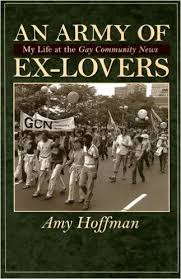 An Army of Ex-Lovers: My Life at the Gay Community News
An Army of Ex-Lovers: My Life at the Gay Community News
by Amy Hoffman
University of Massachusetts Press. 166 pages, $22.95
CURRENTLY THE EDITOR of the Women’s Review of Books and a long-time political activist, Amy Hoffman has written a highly readable memoir of a brief but formative moment in time: her four years, from 1978 to 1982, working at Boston’s weekly newspaper, Gay Community News. Hoffman—who had been a volunteer at the “local socialist-feminist journal” Sister Courage—was hired as a features editor, becoming managing editor by the time she left. Apparently one of the few applicants suitable for the job, or at least the one who unwittingly said the right things about an arty nude cover scheduled to run at the time of her interview, she quips in her new book, An Army of Ex-Lovers, that “nobody on the paper had any journalism experience, but that was only a minor obstacle.”
GCN, whose scope and influence extended nationally—founded in 1973, it was arguably the nation’s first gay weekly—was organized as a collective, with gay men and lesbians working together in (relative) harmony.
Publishing everything from news to reviews, with lots of politics, political analysis, and letters from prisoners, GCN’s mission, in Hoffman’s words, was “explicitly activist” and dedicated to supporting “the most radical expression of the gay liberation movement.” While Hoffman was at the paper, GCN was suing the Federal Bureau of Prisons, and Boston’s police union was threatening to sue GCN. The office was broken into from time to time, windows were shot at, and it suffered a devastating arson fire in 1982, a few weeks after Hoffman quit. The paper kept to its publication schedule, though, in donated space, but Hoffman believes that the paper “was never the same” after the fire.
Hoffman’s title, by the way, is a play on a slogan of the 70’s (though she admits the jest did not originate with her): “An Army of Lovers Cannot Fail” appeared on banners in both Women’s Liberation and Gay Pride marches, and was also popularized by Rita Mae Brown in a poem of the early 80’s, “Sappho’s Reply,” whose last line is “An army of lovers shall not fail.” Actually, it was Plato in The Symposium who originally wrote of “an army of lovers,” referring to Theban military men who were openly involved in same-sex relationships. Doubtless Plato would have appreciated the trajectory from his praise of manly love to Hoffman’s mildly ironic reference to a stereotype about today’s lesbian and gay couples.
There’s a little of Hoffman’s private life woven through this life of GCN, and her self-doubts about her editorial capabilities. There are lovers and friends, concerts and parties, pre-gentrified Boston, the 1979 gay march on Washington, and her conflicted feelings about socializing and having fun as the only lesbian in large crowds of gay men. A full-page reproduction of an early issue of Bad Attitude (a “sort of porno magazine”), of which Hoffman was co-publisher in the mid-1980’s, makes one want to know much more about this phase in her life.
Though it can occasionally be a bit repetitive and its lack of citations is maddening at times, the book is written with gentleness and a dry wit. Hoffman is full of tenderness toward her former colleagues, and she includes some wonderfully evocative photos. Similar tenderness was evinced in her 1997 Hospital Time, which was about the death of GCN staffer Mike Riegle. An Army of Ex-Lovers makes an important contribution to our understanding of gay Boston as well as the history of gay journalism.





